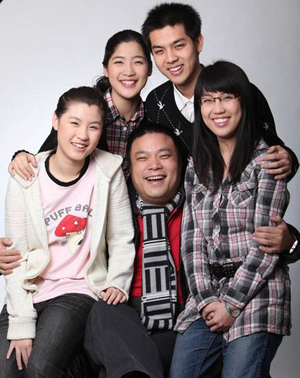A Wolf Dad has emerged to tell China’s parents how to produce successful kids. In Therefore, Peking University Siblings businessman Xiao Baiyou advocates regular beatings as the most effective way to ensure that kids enter top universities. His proof: three of his four kids were admitted to Peking University.
Xiao has been portrayed in the media as the male counterpart of Amy Chua, the Harvard Law School professor who wrote Battle Hymn of the Tiger Mother.
“By beating children once every three days, they can enter Peking University,” is perhaps Xiao’s most famous quote.
He says his fathering philosophy was inspired by his mother whose harsh disciplinary measures he credits with his admission to the top university in Guangdong Province.
Three of Xiao’s four children are currently studying at Peking University, generally considered China’s most prestigious university. The youngest daughter is a high school student focusing in the guzheng, a traditional Chinese instrument. She wants to attend Beijing’s Central Conservatory of Music, China’s top music school.
Xiao’s childrearing philsophy is based on the theory that children have three natures: animality, humanity, and sociality. Before the age of 12, children are ruled by their animal nature and only beatings can teach them the difference between right and wrong. Xiao advocates using a feather duster or a rattan cane and applying a precise number of strokes to the calves or hands accompanied by a clear recitation of the reason for the punishment. Beatings about once every three days is essential to keep them in line at that age, Xiao says.
“Beating children is not that simple,” he says. ”My experience tells me it is not easy to do it scientifically and artistically. How to do it scientifically? I think there must be clear home rules and punishment measures. The kids have to know what is right, what is wrong, or whether they are repeating the same mistakes, where is the wrong part, how many whips to it, and no resistance during when receiving the punishment. And when the punishment’s over, they have to express their resolution to be good next time.”
When his children turned 12 Xiao stopped beating them because, by his philosophy, they had acquired sufficient humanity to respond to lectures. However, he continued to strictly ban candies, sodas, snacks, TV, air conditioners and friends. He feels their relationships should be limited to family and classmates until they attain the age of 18 when they become essentially social creatures.
He says that his kids have asked for democracy at home.
“Yes, we do have democracy in our home,” he says. “However, I am the ‘cracy’ part and you kids are the ‘demo’ part.”
Xiao denies that his methods have produced unhappy childhoods.
“Kids know nothing about happiness,” he says. “My daughter wrote on her diary that she had no happiness but now she is studying at Peking University and is triumphant in this moment. So I believe that when she looks back to her childhood, she will definitely think she had a happy life.”
Xiao’s methods have renewed debate on Asian parenting methods provoked earlier this year by Amy Chua’s Tiger Mother. Critics charge that, like Chua, Xiao is raising kids who will have a slavish mentality. Others take the cynical view that, like Chua, Xiao may be exaggerating his parenting methods to drum up publicity for his recently published book.


